Related Research Articles

Love Affair is a 1939 American romance film, co-starring Charles Boyer and Irene Dunne, and featuring Maria Ouspenskaya. It was directed by Leo McCarey and written by Delmer Daves and Donald Ogden Stewart, based on a story by McCarey and Mildred Cram. Controversial on concept, the official screenplay was re-tooled and rewritten to appease Hollywood censorship and relied on actor input and improvisation, causing long delays and budget extensions.
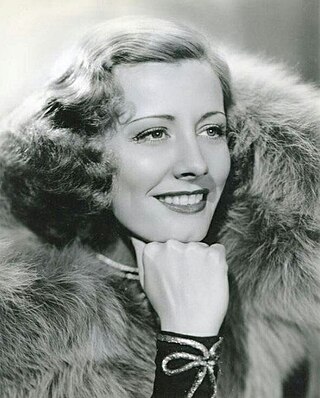
Irene Dunne was an American actress who appeared in films during the Golden Age of Hollywood. She is best known for her comedic roles, though she performed in films of other genres.

The Age of Innocence is a 1920 novel by American author Edith Wharton. It was her eighth novel, and was initially serialized in 1920 in four parts, in the magazine Pictorial Review. Later that year, it was released as a book by D. Appleton & Company. It won the 1921 Pulitzer Prize for Fiction, making Wharton the first woman to win the prize. Though the committee had initially agreed to give the award to Sinclair Lewis for Main Street, the judges, in rejecting his book on political grounds, "established Wharton as the American 'First Lady of Letters'". The story is set in the 1870s, in upper-class, "Gilded Age" New York City. Wharton wrote the book in her 50s, after she was already established as a major author in high demand by publishers.

Charles Douville Coburn was an American actor and theatrical producer. He was nominated for a Best Supporting Actor Academy Award ("Oscar") three times – for The Devil and Miss Jones (1941), The More the Merrier (1943), Princess O'Rourke (1943) and The Green Years (1946) – winning for his performance in The More the Merrier. He was honored with a star on the Hollywood Walk of Fame in 1960 for his contribution to the film industry.

The Devil and Miss Jones is a 1941 American comedy film directed by Sam Wood and starring Jean Arthur, Robert Cummings, and Charles Coburn. Its plot follows a department store tycoon who goes undercover in one of his Manhattan shops to ferret union organizers, but instead becomes involved in the employees' personal lives.
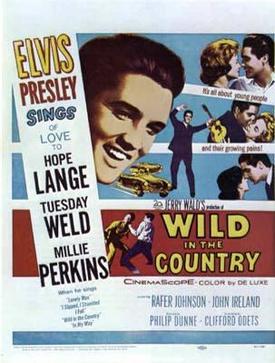
Wild in the Country is a 1961 American musical-drama film directed by Philip Dunne and starring Elvis Presley, Hope Lange, Tuesday Weld, and Millie Perkins. Based on the 1958 novel The Lost Country by J. R. Salamanca, the screenplay concerns a troubled young man from a dysfunctional family who pursues a literary career. The screenplay was written by playwright Clifford Odets.

Impact is a 1949 American film noir drama film starring Brian Donlevy and Ella Raines. Directed by Arthur Lubin, it was shot entirely in Northern California, including scenes in Sausalito at Larkspur in Marin County, on Nob Hill in San Francisco, and throughout the Bay area. The screenplay was based on a story by film noir writer Jay Dratler. Charles Coburn, Helen Walker, Anna May Wong, Philip Ahn, and William Wright appear in support.
"Two Tonys" is the 53rd episode of the HBO original series The Sopranos and the first of the show's fifth season. Written by David Chase and Terence Winter, it was directed by Tim Van Patten and originally aired on March 7, 2004.
"Mayham" is the 68th episode of the HBO original series The Sopranos and the third of the show's sixth season. Written by Matthew Weiner and directed by Jack Bender, it originally aired on March 26, 2006.
"Mr. & Mrs. John Sacrimoni Request..." is the 70th episode of the HBO original series The Sopranos and the fifth of the show's sixth season. Written by Terence Winter and directed by Steve Buscemi, it originally aired on April 9, 2006.
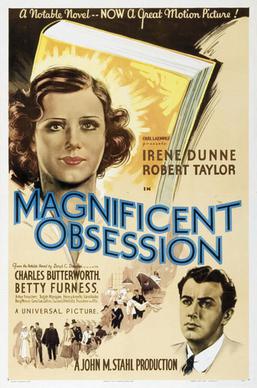
Magnificent Obsession is a 1935 drama film based on the 1929 novel of the same name by Lloyd C. Douglas. The film was adapted by Sarah Y. Mason, Victor Heerman, and George O'Neil, directed by John M. Stahl, and stars Irene Dunne, Robert Taylor, Charles Butterworth, and Betty Furness.

Stanley and Livingstone is a 1939 American adventure film directed by Henry King and Otto Brower. It is loosely based on the true story of Welsh reporter Sir Henry M. Stanley's quest to find Dr. David Livingstone, a Scottish missionary presumed lost in Africa, who he finally met on November 10, 1871. Spencer Tracy plays Stanley, while Cedric Hardwicke portrays Livingstone. Other cast members include Nancy Kelly, Richard Greene, Walter Brennan, Charles Coburn and Henry Hull.

H. M. Pulham, Esq. is a 1941 American drama film directed by King Vidor and starring Hedy Lamarr, Robert Young, and Ruth Hussey. Based on the novel H. M. Pulham, Esq. by John P. Marquand, the film is about a middle-aged businessman who has lived a conservative life according to the routine conventions of society, but who still remembers the beautiful young woman who once brought him out of his shell. Vidor co-wrote the screenplay with his wife, Elizabeth Hill Vidor. The film features an early uncredited appearance by Ava Gardner. In February 2020, the film was shown at the 70th Berlin International Film Festival, as part of a retrospective dedicated to King Vidor's career.

It Grows on Trees is a 1952 American fantasy comedy film directed by Arthur Lubin and starring Irene Dunne in her final screen role. The cast also featured Dean Jagger, Joan Evans and Richard Crenna. It was produced and distributed by Universal Pictures.

The Green Years is a 1946 American drama film directed by Victor Saville and featuring Charles Coburn, Tom Drake, Beverly Tyler and Hume Cronyn. It was adapted by Robert Ardrey and Sonya Levien from A. J. Cronin's 1944 novel of the same name. It tells the story of the coming-of-age of an Irish orphan in Scotland.
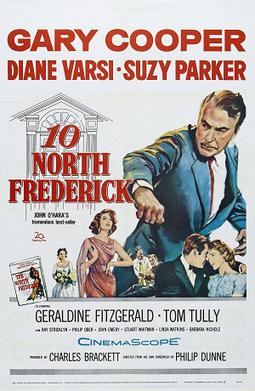
Ten North Frederick is a 1958 American drama film in CinemaScope written and directed by Philip Dunne and starring Gary Cooper. The screenplay is based on the 1955 novel of the same name by John O'Hara.

Colonel Effingham's Raid is a 1946 American comedy film directed by Irving Pichel. It is also known as Berry Fleming's Colonel Effingham's Raid, Everything's Peaches Down in Georgia and Rebel Yell. The screenplay was written by Kathryn Scola, based on a 1943 novel by Berry Fleming. The music score is by Cyril J. Mockridge. The film stars Charles Coburn, Joan Bennett and William Eythe. The plot involves a retired career Army colonel who returns to his hometown, starts writing a column in a local newspaper and takes on the corrupt local politicians to not replace the historic county courthouse.
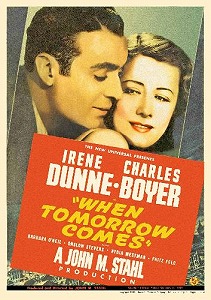
When Tomorrow Comes is a 1939 American romantic drama directed by John M. Stahl, and starring Irene Dunne and Charles Boyer. The screenplay concerns a waitress who falls in love with a man who later turns out to be a married concert pianist. Bernard B. Brown won the Academy Award for Best Sound.

Together Again is a 1944 comedy film directed by Charles Vidor and starring Irene Dunne and Charles Boyer. The screenplay was written by F. Hugh Herbert and Virginia Van Upp, based on story by Herbert J. Biberman and Stanley Russell. The supporting cast features Charles Coburn and Mona Freeman.

Lord Jeff is a 1938 MGM film, set in England, starring Freddie Bartholomew as a spoiled orphan who has gotten mixed up with some crooks, but gets set straight by a stint in a mercantile marine vocational school for orphaned boys.